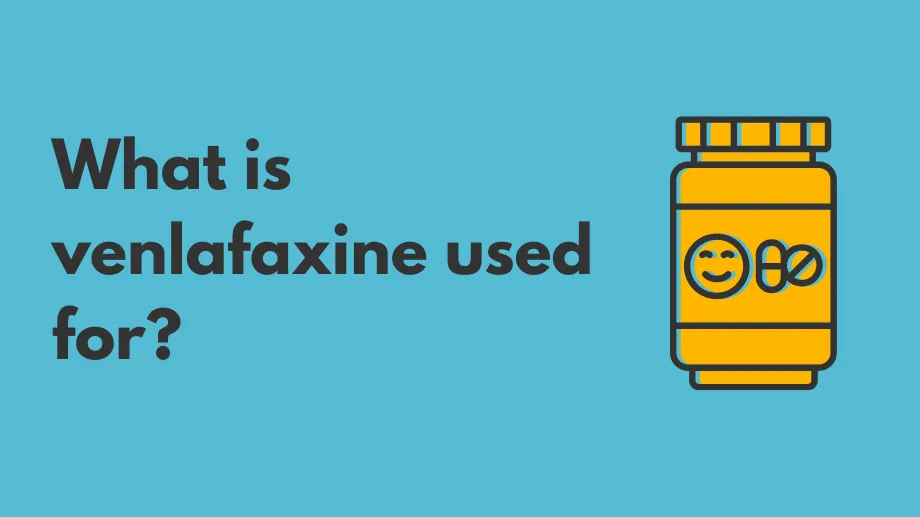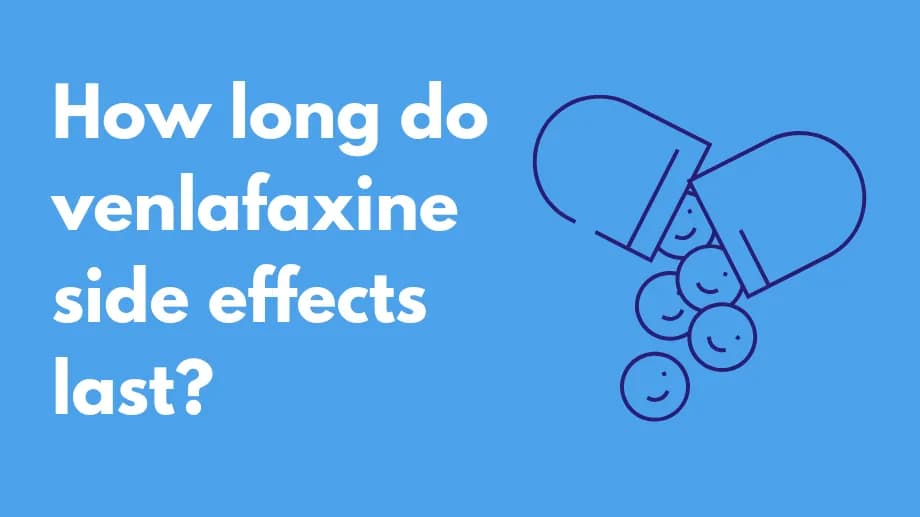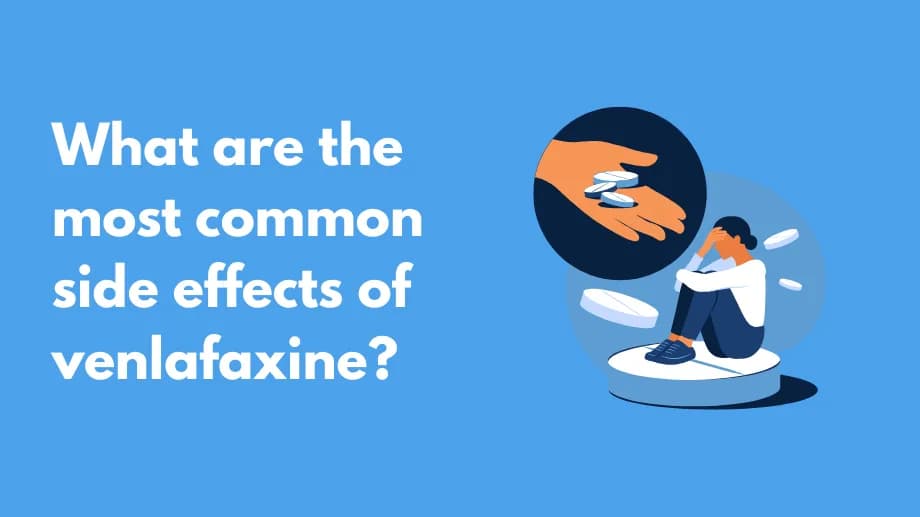What is venlafaxine used for?

Venlafaxine was the first antidepressant in the class of drugs known as serotonin‑norepinephrine reuptake inhibitors (SNRIs). It is an oral medication available in immediate‑release tablets and extended‑release tablets under the brand name Effexor, and as extended‑release capsules under the brand name Effexor XR. Venlafaxine is FDA‑approved to treat adults with:
- Major depressive disorder (MDD). Major depressive disorder is a mental health condition that causes a constant feeling of sadness and loss of interest. Also called clinical depression, it can affect how you think, feel, and behave and can lead to a variety of physical and emotional problems.
- Generalized anxiety disorder (GAD). Generalized anxiety disorder means that you worry constantly, even when there is no reason to. Your doctor may diagnose you with GAD when your worrying happens on most days for at least 6 months.
- Social anxiety disorder (SAD). Social anxiety disorder is an intense, persistent fear of being watched and judged by others. This fear can affect your relationships, daily routines, work, school, or other activities.
- Panic disorder (PD). People with panic disorder have frequent and unexpected panic attacks. A panic attack is a sudden episode of intense fear that triggers severe physical reactions when there is no real danger or apparent cause.
Although not approved, venlafaxine is sometimes used off‑label to treat attention‑deficit/hyperactivity disorder (ADHD), fibromyalgia, diabetic neuropathy, chronic pain, hot flashes, migraine prevention, post‑traumatic stress disorder (PTSD), and obsessive‑compulsive disorder (OCD).
Read on as we go over all the important information you need to know about venlafaxine and answer some frequently asked questions.
Venlafaxine FAQs
How does venlafaxine work?
Venlafaxine (Effexor) is considered a serotonin‑norepinephrine reuptake inhibitor (SNRI). It works by raising the serotonin and norepinephrine activity in your brain. It is believed that maintaining proper levels of serotonin in your brain prevents depression and anxiety, and that boosting norepinephrine reduces neuropathic pain.
How do you use venlafaxine?
Your healthcare provider will determine the dose of venlafaxine that’s right for you. Do not change your dose or stop taking venlafaxine without first talking to your healthcare provider. Stopping this medication may lead to withdrawal symptoms such as agitation, anxiety, fatigue, confusion, mood changes, dizziness, headache, irritability, and seizures.
Venlafaxine may be taken 1 to 3 times daily, depending on the formulation you use. Swallow extended‑release tablets and capsules whole; do not cut, crush, chew, or dissolve them. If you cannot swallow the capsules whole, you can open them and sprinkle the entire contents on a spoonful of applesauce, swallow immediately without chewing, and then drink a glass of water.
This medication may interfere with certain lab tests (including urine tests for amphetamines), possibly causing false results. Make sure lab personnel and all your healthcare providers know you use this medication.
What drug interactions are there with venlafaxine?
When venlafaxine is taken with other drugs, it can change how they work or make some side effects more likely or severe. You should ask your healthcare provider if any prescription medications, over‑the‑counter (OTC) drugs, vitamins, or supplements you take may interact with venlafaxine, including:
- Monoamine oxidase inhibitors (MAOIs) such as isocarboxazid, linezolid, methylene blue, phenelzine, tranylcypromine, and selegiline
- Selective serotonin reuptake inhibitors (SSRIs) such as citalopram, escitalopram, fluoxetine, and sertraline
- NSAIDs such as ibuprofen and naproxen
- St. John’s wort
- Warfarin
- Lithium
- Tramadol
- L‑tryptophan
What are the side effects of venlafaxine?
The most common side effects of venlafaxine seen in clinical trials when compared to placebo include:
- Nausea
- Sleepiness or drowsiness
- Dry mouth
- Constipation
- Sexual problems
- Loss of appetite
- Sweating
Other possible side effects of venlafaxine can include:
- Unusual dreams
- Diarrhea
- Trouble sleeping
- Yawning
- Tremor or shaking
- Dizziness
- Headache
- Blurred vision
- Feeling anxious, nervous, or jittery
- Increased heart rate
- Weight gain or weight loss
Rarely, venlafaxine may cause more serious side effects such as:
- Serious allergic reactions with symptoms such as:
- Hives
- Swelling of your face, tongue, or throat
- Shortness of breath
- Increased risk of suicidal thoughts and behaviors. Notify your healthcare provider immediately if you notice new or worsening depression, suicidal thoughts, or behavior, especially during the first few months of treatment or when your dose changes.
- Serotonin syndrome, especially if taken with other medications that affect serotonin levels. Symptoms include fast heart rate, sweating, muscle stiffness or spasms, fever, and confusion. Seek immediate medical attention if you experience these symptoms.
- A sudden decrease in blood pressure and fainting. Tell your healthcare provider if you experience frequent dizziness.
- Increased risk of bleeding. Notify your healthcare provider if you have bruising that does not get better, black-colored stools, pink or red urine, or unusual bleeding from your nose or gums.
- Manic episodes if you take venlafaxine and have bipolar disorder. Talk to your healthcare provider right away if you notice unusual changes in your behavior.
- Glaucoma. Have an eye exam before beginning venlafaxine. Call your healthcare provider if you have eye pain, swelling, redness, widened pupils, or vision changes (such as seeing rainbows around lights at night).
- Hyponatremia (low sodium levels), with symptoms such as confusion, headaches, dizziness and fainting, seizures, or coma.
- Lung problems. Notify your healthcare provider right away if you experience trouble breathing, cough, or chest pain/discomfort.
- Withdrawal symptoms if you suddenly stop taking venlafaxine, including agitation, anxiety, fatigue, confusion, mood changes, dizziness, headache, diarrhea, seizures, and sexual dysfunction.
These are not all of the possible side effects of venlafaxine. Contact your healthcare professional for medical advice about any possible adverse effects you experience while taking this medication. You can report adverse effects to the FDA at 1‑800‑FDA‑1088 or www.fda.gov/medwatch.
Who should not take venlafaxine?
Venlafaxine should not be taken if you have an allergy to venlafaxine, desvenlafaxine, or any inactive ingredients in that product. Avoid this medication if you have taken a monoamine oxidase inhibitor (MAOI) in the last 14 days.
What should you tell your healthcare provider before using venlafaxine?
Your healthcare provider should know any other medical conditions you have before starting venlafaxine such as:
- Family history of depression, suicide, mania, hypomania, or bipolar disorder
- High blood pressure or other heart problems such as stroke or heart attack
- Bleeding problems
- Glaucoma
- High cholesterol or triglycerides
- Kidney disease
- Liver disease
- History of seizures
- Low sodium levels in your blood
- Lung problems
- Alcohol use
- Pregnancy or plans to become pregnant (venlafaxine may harm your unborn baby)
- Breastfeeding or plans to breastfeed (venlafaxine may pass into your breast milk and harm your infant)
What should you do if you miss a dose of venlafaxine?
If you miss a dose of venlafaxine, take it as soon as you remember. If it is near the time of the next dose, skip the missed dose. Take your next dose at the regular time. Do not double the dose to catch up.
How long does it take venlafaxine to start working?
Many people start to see symptom improvements within 1 to 2 weeks, but full effects may take up to 6 to 8 weeks. You should notice gradual improvements in mood and anxiety as you continue treatment.
What is the maximum dose of venlafaxine?
Your healthcare provider will decide the right dose for you. The usual starting dose is 75 mg per day, but it may be gradually increased up to a maximum of 375 mg depending on your condition, formulation, and response. Lower doses may be used for people with kidney or liver impairment.
Is venlafaxine addictive?
Venlafaxine is not addictive, but stopping it abruptly can cause serious side effects such as dizziness, sleep disturbances, irritability, confusion, mood changes, headaches, diarrhea, and seizures. Your healthcare provider will taper your dose gradually to avoid these complications.
Related Medications
- Pristiq (desvenlafaxine ER)
- Cymbalta (duloxetine)
- Savella (milnacipran)
- Fetzima ER (levomilnacipran ER)


